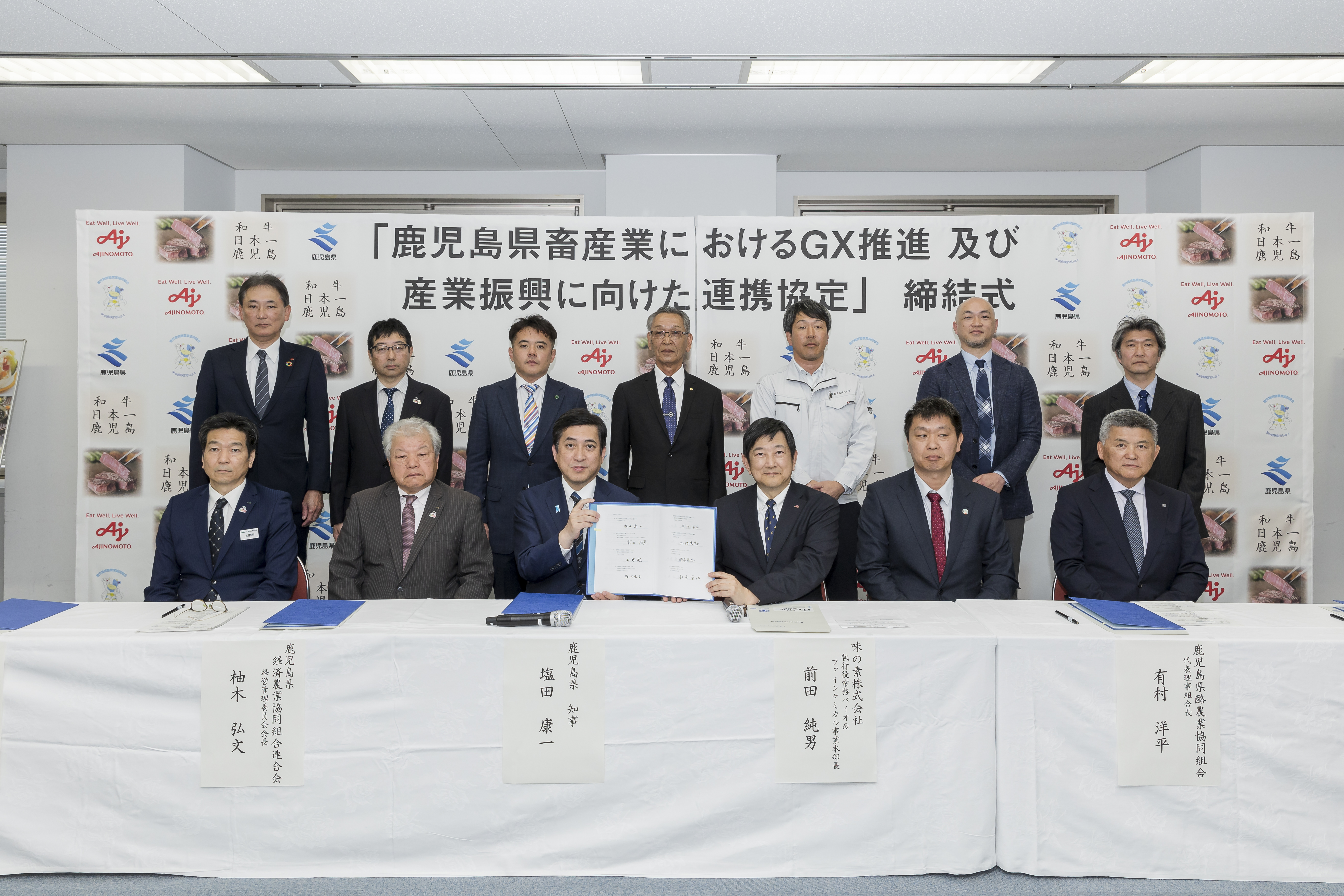Along with society
“AminoScience” for Sustainable Beef and Dairy Cattle Farming

Ajinomoto Co., Inc. aims to contribute to solving global warming by utilizing AjiPro®-L, an amino acid lysine formulation for cattle, while reducing GHG emissions related to cattle growth.
Solving Contradictions with “AminoScience”

As global population growth drives increased demand for protein, beef and dairy production are attracting attention as a source of protein. However, growing cattle emits GHGs such as nitrous oxide from manure and methane from burps, as well as carbon dioxide from feed production. These emissions account for about 9.5% of global GHG emissions and are considered one of the causes of global warming. To this end, solving this issue is a challenge. Moreover, the profitability of farm operations is declining due to recent sharp rises in feed prices, resulting in challenges in improving profitability while reducing GHG emissions. Given these circumstances, demand is rising for solutions that leverage AjiPro®-L, a lysine formulation for cattle developed based on “AminoScience”*1.
- *1A collective term for the various materials, functions, technologies, and services derived from research and implementation processes with a rigorous focus on the function of amino acids. It also refers to the Ajinomoto Group’s unique scientific approach to connect these to resolving social issues and contributing to well-being.
Effects of AjiPro®-L on Reducing GHG
Ajinomoto Co., Inc. launched AjiPro®-L in 2011 to supplement lysine, an essential amino acid often deficient in cattle growth. With ordinary lysine supplements, most of the lysine broken down by microorganisms in the rumen, the first of four stomachs in cattle. As a result, it fails to reach the small intestine and is not absorbed into the body as a nutrient. With AjiPro®-L, our proprietary manufacturing technology allows lysine to be efficiently delivered to the small intestine where it can be absorbed as a nutrient. These effects are supported by solid scientific evidence. AjiPro®-L is used worldwide and holds the top market share (research by the Company) of the lysine formulation for cattle.
In researching the benefits of the product, the Company found that the use of AjiPro®-L reduces the amount of dairy and beef cattle feed, such as soybean meal (which is high in protein, but is costly and contains excess amino acids), while supplementing insufficient amino acids and improving the amino acid balance in the body. These effects enable farmers to reduce nitrous oxide in manure and carbon dioxide from feed production while maintaining milk yield and reducing feed costs. In addition to the above methods, our research also found that adding AjiPro®-L to beef cattle feed during the fattening period to supplement lysine increases the amount of amino acids used by the body and improves productivity, thereby reducing the number of fattening days or increasing carcass weight. This method enables the Company to reduce all GHG emissions associated with cattle growth, including methane and nitrous oxide per unit weight, while reducing production costs.

Effects of Company Solutions on Sustainability and Improvements in Economic Value

In April 2024, the Company entered a partnership agreement with Kagoshima Prefecture and livestock-related organizations in the prefecture, which ranks No.1 in Japan with the largest number of beef cattle (approx. 343,000 cattle). This agreement aims to reduce GHG emissions and stimulate the beef and dairy cattle farming industries. While Kagoshima Prefecture is one of the leading livestock-producing prefectures in Japan, approx. 20% of the GHG emissions in the prefecture are a result of livestock production. Of this amount, approx. 60% comes from cattle. Furthermore, recent sharp hikes in feed prices have caused profitability to decline in the livestock industry, requiring immediate action. In response, Kagoshima Prefecture works toward Green Transformation (GX), which aims to reduce GHG emissions and improve industrial competitiveness. The Company aims to reduce GHG emissions from beef and dairy cattle and improve the profitability of livestock businesses in Kagoshima Prefecture by promoting solutions utilizing AjiPro®-L in collaboration with livestock-related organizations, livestock businesses, universities, financial institutions, and other stakeholders within the prefecture.
The Company also registered its core solution leveraging amino acids to reduce GHGs as a methodology*2 under the J-Credit Scheme, a government-approved program that converts GHG emission reductions and absorption into tradable credits. Of the methodologies registered, leveraging amino acids to improve beef cattle productivity and reduce GHGs is the only methodology that reduces methane in burps in addition to GHGs in manure.
Going forward, the Company will work with partners not only in Japan but also overseas to implement solutions on a global scale, contributing to the creation of sustainable food systems while reducing the burden on the global environment and creating economic value.
Moreover, as the Company works to reduce negative impacts, it aims to strengthen strategies and initiatives based on “AminoScience” to create more positive impacts. In this way, the Company continues to strive for dramatic and steady improvements to corporate value.
- *2The scope of application, the calculation methods of emission reduction and absorption, monitoring methods, etc. for each technology contributing to the reduction and absorption of GHG emissions.
- Press Release (April 2, 2024): Ajinomoto Co., Inc. Signs Agreement with Kagoshima Prefecture to Reduce Greenhouse Gas Emissions from Beef and Dairy Cattle Farming and Stimulate the Industry (Japanese only)
- Press Release (September 19, 2024): Ajinomoto Co., Inc. and Danone Launch Global Strategic Partnership to Reduce Greenhouse Gas from Dairy Industry
